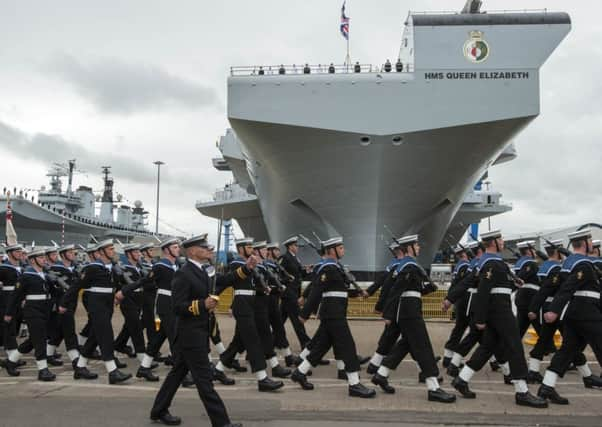Leaders: Shades of grey behind red, white and blue


The RAF’s Red Arrows flew past as if glued together, bands played and Union flags flapped everywhere, the only spontaneity allowed in a programme conducted with, well, military precision.
All were dwarfed by the vastness of the largest warship ever to be built in Britain, a manifestation of national ambition and projected power. No chests swelled more than those of the workforce that have assembled the 65,000 tonnes of her at Rosyth. This was a centuries-old scene – the bringing together of craft and industrial skills at a great cost in national treasure to produce military might blessed by royalty.
Advertisement
Hide AdAdvertisement
Hide AdFew of those who merely spectated could fail to appreciate that while all such ceremonies have political significance, this one had more than most. This was the British government and its mightiest works on parade in Scotland, mutely but nonetheless loudly saying “stay with us if you want to be part of such great things in the future”.
Many may agree with that, and many may disagree, wishing to leave such imperial grandeur behind, believing it to be more delusional than real. For those who have worked on the carrier and the many more whose employment depends on defence work, there is a more prosaic question: will my job be more or less secure with a Yes or a No vote in September?
This anxiety did surface with some mild booing of both First Minister Alex Salmond and Prime Minister David Cameron? Whether the hooting at the latter was due to his Conservatism or his unionism was impossible to tell.
Like much of the debate, the question of the future of defence-related work has been reduced to black-and-white opposites when shades of grey might be more appropriate.
It seems unlikely that if Scotland votes for independence, the rest of the UK’s defence procurers will regard Scotland as if it had been wiped from the map. After all, Britain buys lots of defence equipment from America, not least the aircraft due to be based on the ship.
And since the majority of Britain’s naval shipbuilding expertise is in Scotland, would the rest of the UK want to indulge in the expense of recreating that expertise south of the Border? As this would be the kind of political decision that has given us an aircraft carrier but as yet no aircraft to put on it, they might do. Or they might not.
But there is also a basic reality here – it is a lot easier to win defence work from your own government than from a foreign one, even a close friend. That is a fundamental uncertainty than Mr Salmond cannot wish away.